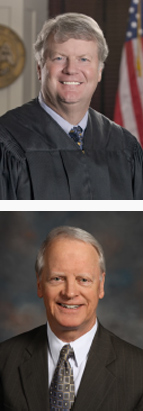
Administrative Office of Courts
Special Committee on Judicial Election Campaign Intervention appointed January 31, 2018 Five members have been appointed to the Special Committee on Judicial Election Campaign Intervention. The Special Committee, authorized by the Code of Judicial Conduct, is designed to respond swiftly to allegations of judicial election campaign misconduct.  The Special Committee for the 2018 election year includes Court of Appeals Presiding Judge T. Kenneth Griffis of Ridgeland, appointed by Supreme Court Chief Justice Bill Waller Jr.; Chancellor Ronald Doleac of Hattiesburg, appointed by Supreme Court Presiding Justice Michael K. Randolph; attorney William Walker Jr. of Jackson, appointed by Supreme Court Presiding Justice James W. Kitchens; attorney Thomas A. Wicker of Tupelo, appointed by Supreme Court Justice Josiah D. Coleman; and attorney Everett T. Sanders of Natchez, appointed by Court of Appeals Presiding Judge Tyree Irving. The order naming the appointees was filed Jan. 30. The Code of Judicial Conduct requires appointment of the Special Committee during each year in which judicial elections are held. Nonpartisan judicial elections will be held Nov. 6 for one Supreme Court seat, five Court of Appeals positions, 57 Circuit Court judgeships, 52 Chancery judgeships and 31 County Court judgeships. The Supreme Court created the Special Committee in a 2002 revision to the Code of Judicial Conduct. Canon 5 F says that the Special Committee's responsibility "shall be to issue advisory opinions and to deal expeditiously with allegations of ethical misconduct in campaigns for judicial office....The objective of the Special Committee shall be to alleviate unethical and unfair campaign practices in judicial elections...." The five-member committee can offer advisory opinions and investigate complaints of judicial campaign conduct. If the Special Committee finds evidence of some campaigning impropriety, it may issue a confidential cease-and-desist request to the candidate. If a cease-and-desist request is disregarded or if unethical or unfair campaign practices continue, the Special Committee may issue a public statement about violations. If campaign conduct appears to violate an election law or a canon of the Code of Judicial Conduct, the matter will be turned over to the Commission on Judicial Performance. #### |